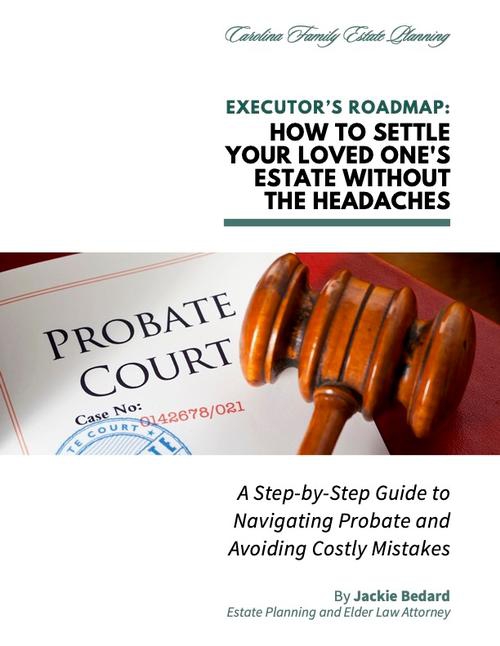
Estate planning can feel overwhelming, especially when you hear terms like "probate" and "non-probate assets." Understanding these concepts is essential for protecting your loved ones from unnecessary legal headaches and ensuring your wishes are honored.
Let’s simplify the probate process and explain how certain assets can avoid it altogether—saving time, money, and stress for your family.
What Are Probate Assets?
Probate is the legal process where a court oversees the distribution of a person’s assets after they pass away, ensuring debts are paid, and assets are transferred to the rightful heirs.
Probate assets are those solely owned by an individual at the time of their passing that do not have any beneficiary designation or similar. Since these assets lack automatic transfer mechanisms, the court must oversee their distribution through the probate process.
Examples of Probate Assets:
-
Personal Property: Items like jewelry, artwork, or collectibles.
-
Solely Owned Bank Accounts: Accounts without designated beneficiaries.
-
Real Estate: Property titled only in the decedent’s name or as tenants in common.
-
Life Insurance Policies: Policies where the estate is named as the beneficiary.
-
Business Interests: Ownership shares without succession arrangements.
Without proper planning, probate can become lengthy, expensive, and open to public scrutiny.
What Are Non-Probate Assets?
Non-probate assets bypass the court system because they’re designed to transfer ownership automatically upon death. These assets are faster, more private, and often more straightforward to manage.
Examples of Non-Probate Assets:
-
Beneficiary-Designated Accounts: Bank or investment accounts with payable-on-death (POD) or transfer-on-death (TOD) designations.
-
Retirement Accounts: 401(k)s or IRAs with named beneficiaries.
-
Jointly Owned Property: Real estate or vehicles owned jointly with rights of survivorship.
-
Trust Assets: Items placed in a properly funded Revocable Living Trust.
Planning for non-probate assets ensures they’re distributed as intended, without unnecessary delays.
Key Differences Between Probate and Non-Probate Assets
The main distinction lies in how ownership is transferred:
Probate Assets:
-
Require inclusion in a Will.
-
Subject to court oversight, which can delay distribution and increase costs.
-
Become part of the public record.
Non-Probate Assets:
-
Transfer directly to named beneficiaries.
-
Avoid probate entirely, providing faster and more private resolution.
-
Depend on accurate beneficiary designations or joint ownership.
Should I Include Non-Probate Assets in My Will?
No! Non-probate assets operate independently of your Will. If there’s a conflict between your Will and a beneficiary designation, the latter takes precedence.
For example, if your 401(k) names your eldest child as the beneficiary, but your Will states it should go to your youngest, the 401(k) will go to the eldest. Regularly updating beneficiary designations helps prevent confusion or conflict.
Why This Matters for North Carolina Residents
In North Carolina, probate assets are distributed according to the terms of the most recent valid Will. However, if there is no valid Will, these assets are distributed based on intestacy laws, which may not align with your wishes.
Without proper planning, non-probate assets might unintentionally go to outdated beneficiaries.
For example, we have seen estates where the deceased was in a second marriage. During estate administration, we discovered life insurance policies with outdated beneficiary designations that still named the ex-spouse from a prior marriage as the beneficiary. Situations like this can create significant stress and financial loss for surviving loved ones.
Taking a proactive approach prevents unnecessary legal disputes and ensures your loved ones are taken care of.
How to Protect Your Assets and Simplify Your Estate Plan
Here’s how you can take control of your assets and create a comprehensive estate plan:
-
Inventory Your Assets: List everything you own, including real estate, financial accounts, and personal belongings.
-
Check Beneficiary Designations: Confirm that all non-probate assets have accurate and up-to-date beneficiary designations.
-
Consider a Trust: Placing assets in a Revocable Living Trust allows you to avoid probate and maintain privacy.
-
Work with an Expert: An experienced estate planning attorney can guide you through North Carolina’s specific laws and help avoid common pitfalls and help you create a cohesive plan for all of your assets.
Protect Your Legacy Today
Understanding the difference between probate and non-probate assets is a vital step in estate planning. It’s about more than just dividing your belongings; it’s about sparing your loved ones unnecessary stress and ensuring your wishes are honored.
At Carolina Family Estate Planning, we help North Carolina residents create customized estate plans that protect their legacy. Ready to get started? Schedule a case assessment today, and let us help you take the next step toward peace of mind.


